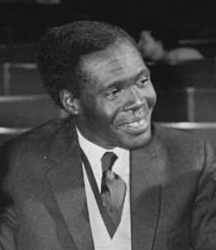Kikosi Maalum
Kikosi Maalum (meaning "Special Force" in Swahili), also known as the Special Battalion[1] or the grand coalition,[2] was a militia of Ugandan exiles formed in Tanzania to fight against the regime of Idi Amin. The unit was founded by and loyal to former Ugandan President Milton Obote, and served as his de facto private army. It was commanded by former army officers David Oyite-Ojok and Tito Okello. Kikosi Maalum took part in the Uganda–Tanzania War, fighting alongside the Tanzanian military against Amin's forces. In course of this conflict, the militia was nominally unified with other Ugandan rebel groups, forming the Uganda National Liberation Army (UNLA) in 1979. After the fall of Amin's regime and Obote's return to power, Kikosi Maalum became the core of Uganda's new national army.
| Special Force | |
|---|---|
Kikosi Maalum | |
| Leaders | Milton Obote David Oyite-Ojok Tito Okello |
| Size | c. 600–800 (late 1978) c. 5,000 (Sept. 1979) |
| Part of | Uganda National Liberation Army (from 1979) |
| Allies | |
| Battles and war(s) | Uganda–Tanzania War Ugandan Bush War (unofficially) |
History

Milton Obote had served as Uganda's first President until he was overthrown by Idi Amin in the 1971 Ugandan coup d'état. He and a substantial number of his followers consequently organized a militant anti-Amin resistance movement in Tanzania whose government was supportive of their cause. Obote managed to organize a guerrilla force, the "People's Army", and attempted to invade Uganda in 1972. His forces were completely defeated and many were killed or captured.[3] The remnants of his rebel army were subsequently organized as Kikosi Maalum. By 1978, the unit had about 600[4] or 800 trained fighters,[1] most of whom were ex-soldiers who had fled Uganda due to Amin's ethnic and political purges.[2] It mostly recruited Acholi and Langi, ethnic groups that had supported Obote before his overthrow.[5]
When the Uganda–Tanzania War broke out in late 1978, Kikosi Maalum acted as auxiliaries for the Tanzania People's Defence Force in combat against Amin's Uganda Army. Obote also used Kikosi Maalum and associate guerrilla groups to instigate a revolt against Amin in Uganda, but these attempts failed,[6] most notably during the Battle of Tororo.[7] While advancing into southern Uganda, Kikosi Maalum militants terrorized Muslims in the Ankole region and occasionally clashed with another rebel faction, Yoweri Museveni's FRONASA, despite being officially allies.[4] The Tanzanian government subsequently organized the Uganda National Liberation Front (UNLF) and its military wing, the Uganda National Liberation Army (UNLA), as umbrella organizations to unify all Ugandan rebel factions, including Kikosi Maalum. Regardless of this nominal unification, the UNLF was split into numerous sub-units according to the wishes and needs of the Tanzanian military. As result, Kikosi Maalum continued to operate as separate force. Its troops aided the Tanzanians in several battles, and helped to end Amin's regime.[1] As the fighting was still ongoing, Kikosi Maalum was rapidly expanded by enlisting new members in territories conquered from Amin's forces.[4] As result, the militia was initially the most powerful Ugandan rebel group in the UNLA, allowing Obote to gain much influence in the UNLF Military Commission.[8]
After Uganda–Tanzania War's end in 1979, a new UNLF government was formed to govern Uganda. Obote quickly began to dominate this government, and outmaneuvered his political rivals.[9] Accordingly, he tried to empower Kikosi Maalum which had become his private army. The unit had about 5,000 fighters by September 1979.[4] These troops provided the core for Uganda's new national army. After Obote officially returned to power as President following the disputed 1980 election, opposition groups launched rebellions. Kikosi Maalum veterans consequently fought for Obote's government in the Ugandan Bush War. After years of civil war, Obote was ousted in a coup d'état by Tito Okello who was in turn defeated by Yoweri Museveni in 1986. Thereafter, Kikosi Maalum veterans were retrenched from the military.[9]
In the 2010s, 100 Kikosi Maalum veterans formed the "Kikosi Maalum Cooperative Society Limited" to advocate for their interests and lobby for government recognition of their role in the overthrow of Idi Amin.[9]
References
- Cooper & Fontanellaz 2015, p. 27.
- Golooba-Mutebi 2008, p. 11.
- Cooper & Fontanellaz 2015, pp. 15–17.
- Otunnu 2017, p. 46.
- Golooba-Mutebi 2008, p. 13.
- Cooper & Fontanellaz 2015, p. 28.
- Cooper & Fontanellaz 2015, p. 62.
- Otunnu 2017, p. 55.
- Odongo, Ronald (22 March 2014). "Former Members of Kikosi Maalum Demand Gov't Recognition". Uganda Radio Network. Retrieved 30 March 2019.
Works cited
- Cooper, Tom; Fontanellaz, Adrien (2015). Wars and Insurgencies of Uganda 1971–1994. Solihull: Helion & Company Limited. ISBN 978-1-910294-55-0.CS1 maint: ref=harv (link)
- Golooba-Mutebi, Frederick (January 2008). "Collapse, War and Reconstruction in Uganda. An analytical narrative on state-making" (PDF). Makerere University Crisis States Working Papers Series (2). ISSN 1749-1800.CS1 maint: ref=harv (link)
- Otunnu, Ogenga (2016). Crisis of Legitimacy and Political Violence in Uganda, 1890 to 1979. Chicago: Palgrave Macmillan. ISBN 978-3-319-33155-3.CS1 maint: ref=harv (link)
- Otunnu, Ogenga (2017). Crisis of Legitimacy and Political Violence in Uganda, 1979 to 2016. Chicago: Palgrave Macmillan. ISBN 978-3-319-33155-3.CS1 maint: ref=harv (link)